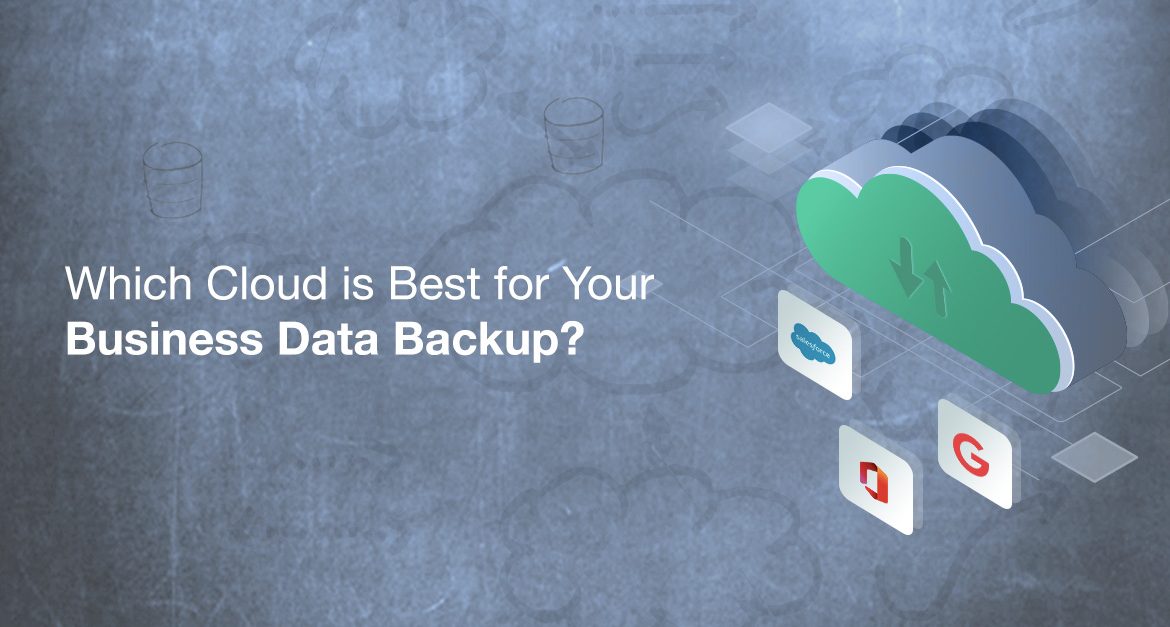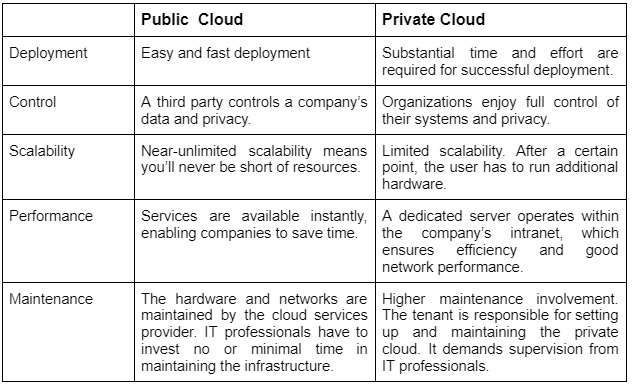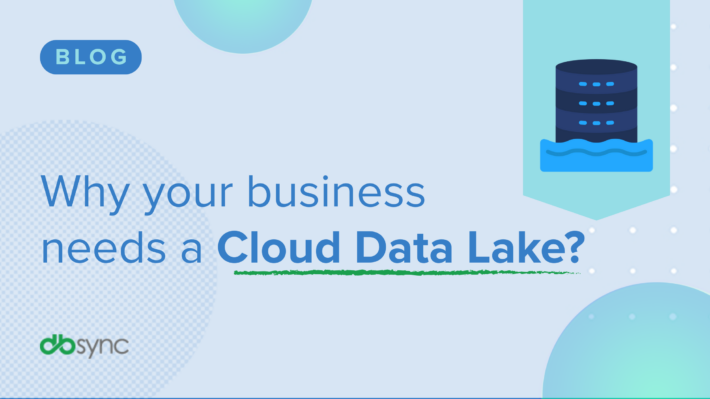Which Cloud is Best for Your Business Data Backups?

Any organization deciding to venture into the cloud storage platform must first understand the difference between a public and a personal cloud. Regardless of how large or small a business is, data is a critical aspect of running it well. The debate on which cloud model is best to protect it often arises when a corporation plans to migrate to the cloud. Both the private and public cloud models have their own set of pros and cons.
Private Cloud Backup v. Public Cloud Backup
Organizations tend to leverage all cloud deployments to enhance business productivity. The below table showcases the high-level comparison between the public and private cloud backup solutions:

Public Cloud Backup
The public cloud is owned and operated by third-party vendors, with users accessing the services over the web. These users essentially share the identical hardware, storage, and network devices with other users (tenants) at no cost or via a freemium or subscription-based model.
Merits
- Simple and easy: Public clouds are available as a service on the internet and are easy to deploy.
- Cost: Initial investment is very low.
- Less time: The IT resources and services are available immediately, saving time for the company.
- No maintenance: The hardware and networks are maintained by the cloud services provider. Internal IT staff have no responsibility in maintaining the infrastructure.
- No contracts: No long-term commitment with service providers because public clouds are usually pay-as-you-go models.
Demerits
- Lacks proper controls: The client has no control of data or infrastructure. There are issues of data privacy and integrity. The service level policies and compliance are completely enforced by the service provider.
- Performance: The performance of the network depends on the speed of the internet connectivity.
- Weak on Security: Since the hardware resource is shared between multiple users, IT security issues are more acute and data is vulnerable to theft.
- Customization: Customization of services is not an option for every customer, as the Public Cloud follows a standard structure.
Is it a good choice for your business?
Public clouds meet the wants of thousands of varied users. Amazon uses these services for better server endurance whereas Azure relies on this solution to tackle geo-redundancy. Both Amazon and Azure offer SLAs that guarantee uptime.
Azure cloud storage offers high availability by replicating anything stored in their cloud to six different locations. This makes sure that even if 5 out of 6 locations fail, end-users won’t feel any disruption or lack access to their data.

 Sync data from Business Central to Azure Data Lake Gen2
Sync data from Business Central to Azure Data Lake Gen2

 Sync data from Business Central to Oracle
Sync data from Business Central to Oracle

 Sync data from Business Central to AWS Redshift
Sync data from Business Central to AWS Redshift
Besides protection, uptime, and the general-purpose tools of public clouds, another good use of this technology is long-term storage and retention. The storage servers are built to last. Therefore, they’re good for year-long archives, such as those needed by the medical industry, which requires decades-long retention. By leveraging public cloud storage, they’ll have reliable long-term storage with reduced costs.
What to look for when choosing a Public Cloud backup vendor
When choosing a public cloud vendor, always select a vendor who has their solutions deployed within the public cloud. This shows that they need the expertise to guide you through the method.
A vendor with storage technology within the cloud makes the combination process very simple for an enterprise. A package deal would combine their technology with cloud backup. This helps control the value of the cloud, which may be very tricky now and then. This package would be charged on a Virtual Machine (VM) or per workstation or followingTerabyte basis, the organization mustn’t handle “surprise” costs at the tip of the month or year.
Private Cloud Backup
A private cloud serves one tenant on dedicated hardware. It is often founded at the organization’s on-site data center or hosted by a third-party service provider. These vendors are responsible for managing the infrastructure. The servers are isolated, delivered through a personal network, and not shared with other users
Merits
- Controls: Better controls for data, users, and information assets.
- Cost: Initial investment for hardware is very high, particularly in the case of on-premise infrastructure.
- Security: The cloud belongs to a single client. Hence, the infrastructure and systems can be configured to provide high levels of security.
- Superior Performance: Normally private clouds are deployed inside the firewall of the organization’s intranet which ensures efficiency and good network performance.
- Easy Customization: The hardware and other resources can be customized easily by the company
Demerits
- Cost: Costs are substantial in the case of building an on-premise private cloud. The running cost includes personnel and periodic hardware upgrade costs. In the case of an outsourced private cloud, operating costs will include per-resource usage and are subject to change at the discretion of the service provider.
- Underutilization: In some instances, the resources subscribed are underutilized. Hence, optimizing the utilization of all resources is a challenge.
- Capacity Ceiling: Due to the physical hardware limitations with the service provider, there is often a capacity ceiling to handle only a certain amount of servers or storage.
- Vendor Lock-in: This can be a major impediment in private cloud adoption especially when the hardware and infrastructure are outsourced. This is a service delivery technique where the client company is forced to continue with the same service provider, thus preventing the client from migrating to another vendor.
Is it a good choice for your business?
Contrary to Public Cloud Storage, Private Cloud is for enterprises that don’t want or shouldn’t keep their data in a shared location. For such an enterprise, isolated and dedicated cloud storage is a better option because it allows for more control with no noise. In other words, the private cloud offers more room for personalization. The user can deploy the private cloud specifically per their requirements.
For instance, in banks, IT environments process large volumes of transactional data. This data needs security, and tailored performance. Leveraging private cloud storage for this use-case improves the user experience and delivers per their requirements. Similarly, any use-case where the user has specific requirements and wishes to stay in control is more suited to private cloud storage technology than public cloud storage technology.
Why do you need a Cloud Integration Platform?
What to look for when choosing a Public Cloud backup vendor
While trying to find a non-public cloud storage solution, it’s essential to specify cloud storage requirements and vital to settle on a vendor who has the proper tools to cater to those requirements.
For instance, if you’re looking to leverage private clouds for cloud backups and faster data recovery, then their solution should have data services like synchronous replication, delta-based snapshots, granular file recovery, among many others
Type of Cloud-based Backup Solution to Use as IT Consultant/MSP
As cloud-based computing and data storage becomes increasingly common, managed services providers (MSPs) should make the most of the greater flexibility, internal control, and security that these solutions provide.
As MSPs decide what form of cloud-based backup solution to use, a key factor to consider is the cloud destination– whether the backups are stored publically or in private clouds. MSPs that choose a backup solution that uses their tailor-built private cloud allows their backup vendor to manage every aspect of storage, security, and cloud infrastructure. They can benefit by using backup solutions that make use of purposely built private clouds because the entirety of the cloud’s resources is devoted to receiving incoming backups and processing recovery requests. This results in an efficient, seamless connection between software and data centers.
Conclusion
The debate over whether a private or a public cloud storage option is the best remains elusive. As noted, each option has positives and negatives, depending upon a business’s unique requirements, budget, etc. Thus, it’s impossible to recommend one over the other, but rather to advise users to take into account the pros/cons (based on the purpose of their enterprise, cost, security, flexibility needs, etc), and judge accordingly.
FAQs
What is the main difference between public and private cloud backup?
Public cloud backup is shared, managed by third-party vendors, and accessed over the internet, while private cloud backup serves one tenant on dedicated hardware, offering more control and customization.
What are the key advantages of public cloud backup?
Public cloud backup is cost-effective, easy to deploy, requires no maintenance, and offers immediate access to IT resources with a pay-as-you-go model.
What are the primary benefits of private cloud backup?
Private cloud backup provides better data control, enhanced security, superior performance, and easy customization to meet specific business needs.
What are the drawbacks of public cloud backup?
Public cloud backup lacks control over data and infrastructure, has weaker security due to shared resources, and offers limited customization options.
When should a business choose private cloud backup over public?
Private cloud backup is ideal for businesses like banks that require high security, tailored performance, and control over sensitive data, avoiding shared environments.
